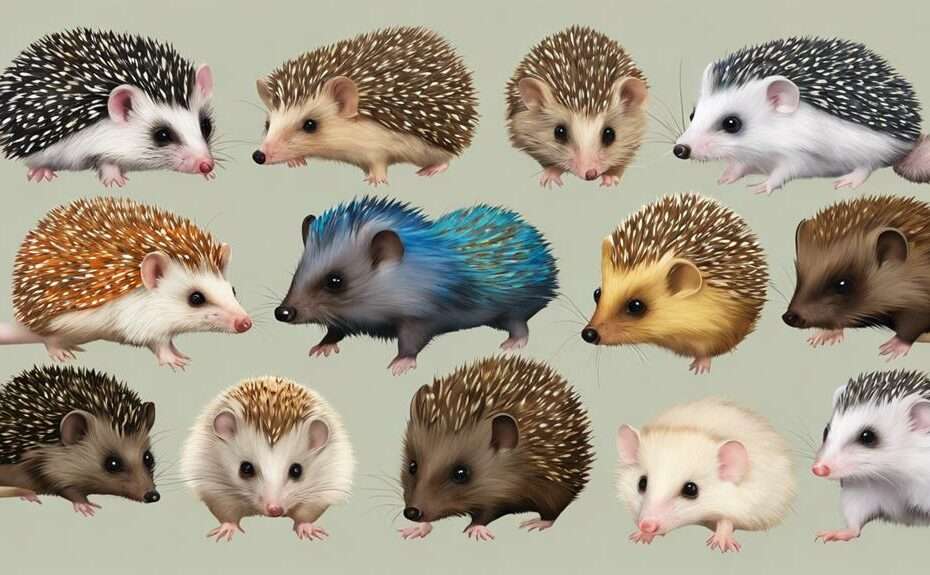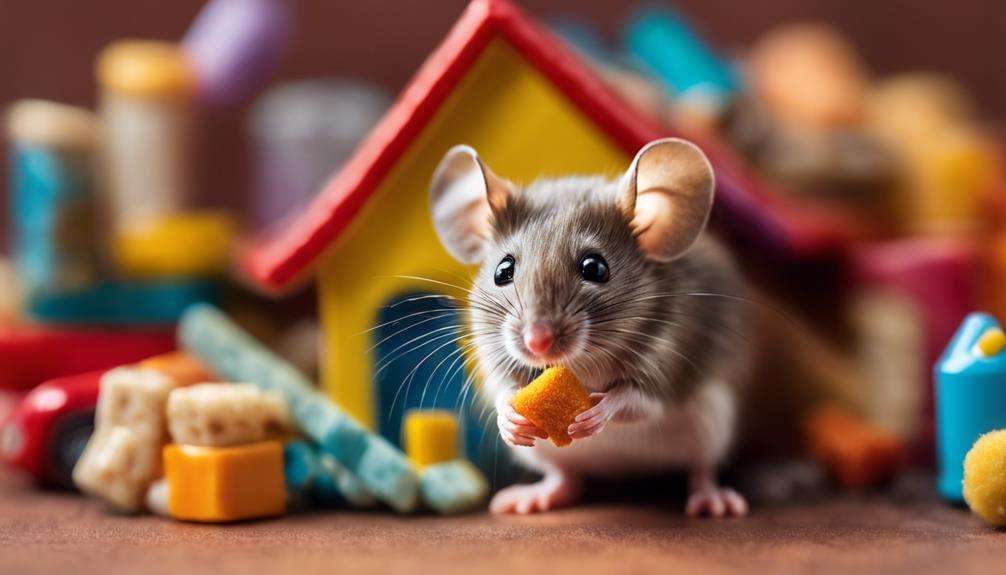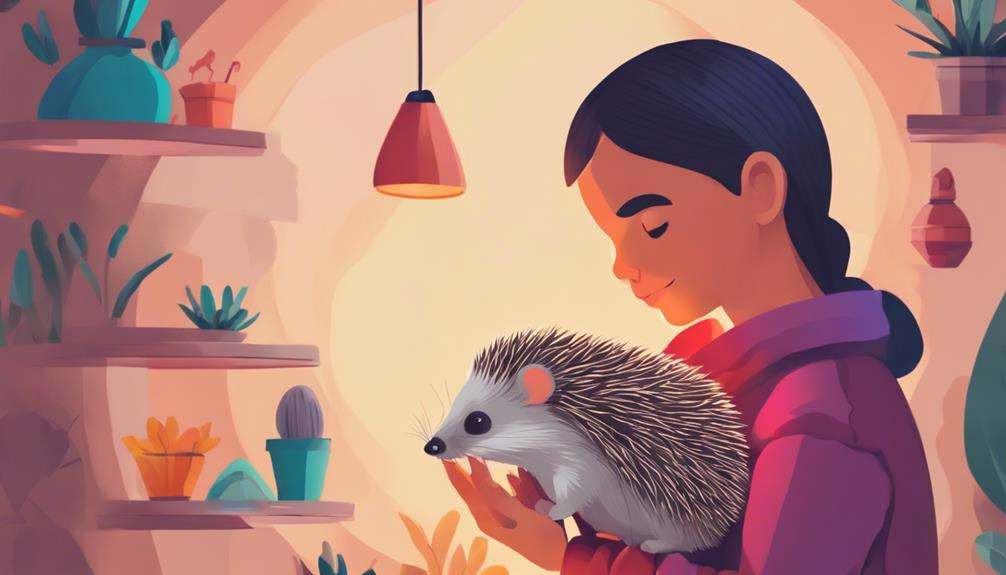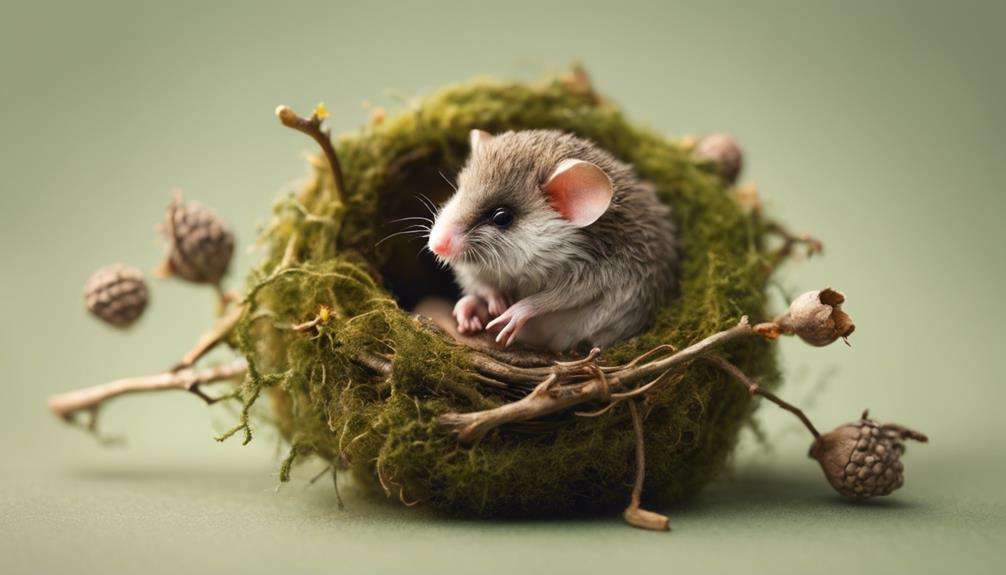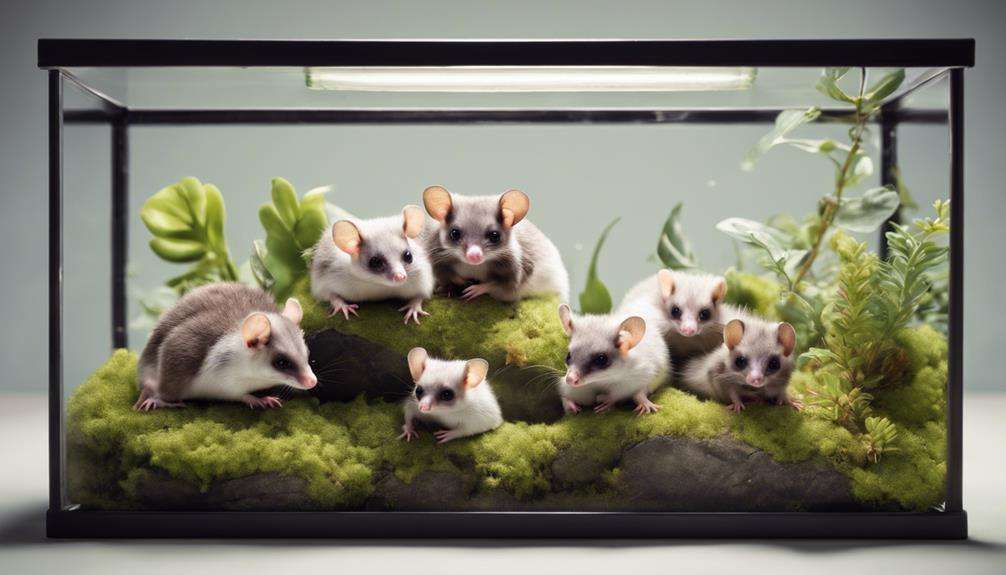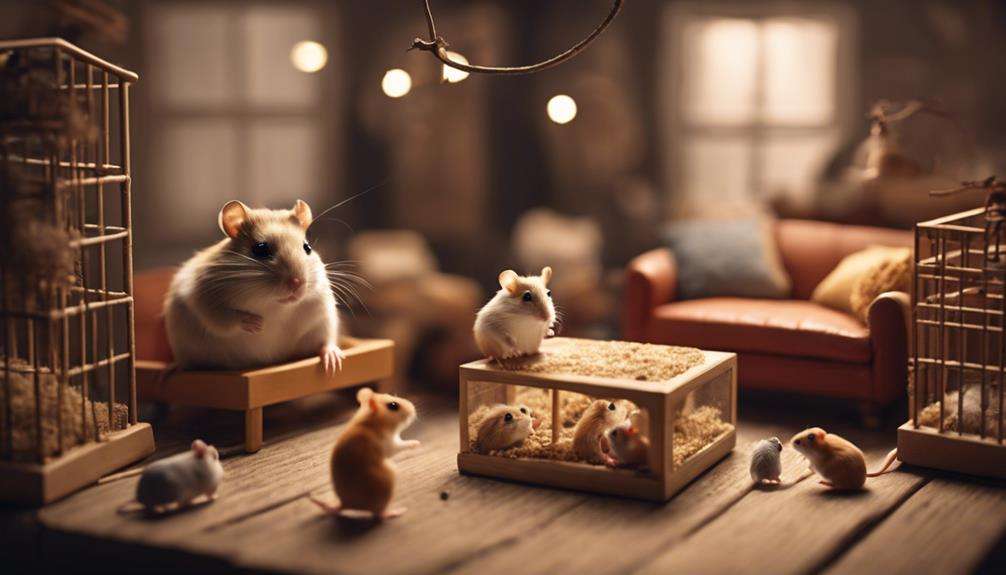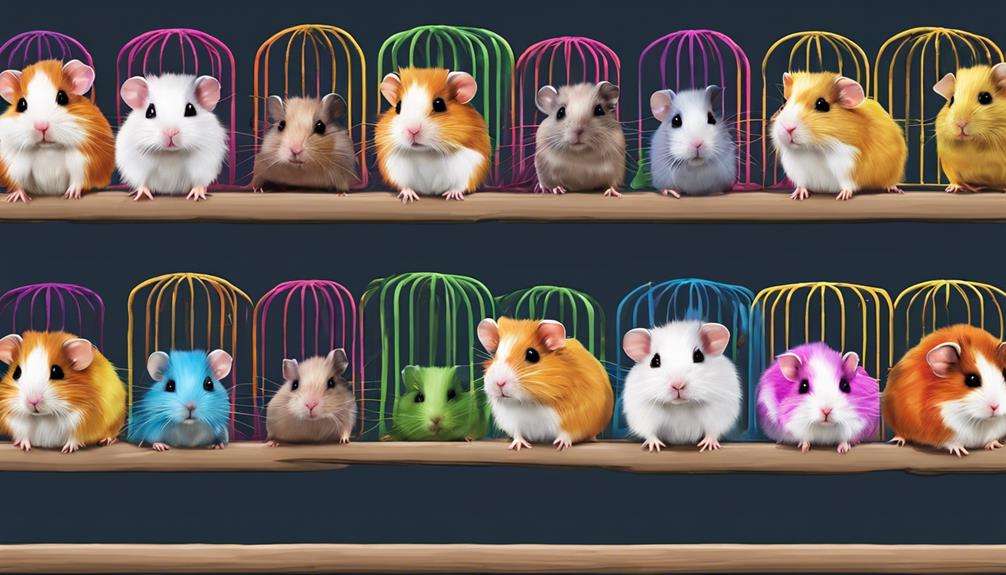Imagine a world where your furry friend comes in all shapes and sizes, bringing joy and companionship to your home. But have you considered the lesser-known small mammal breeds that could make a perfect addition to your family?
These unique creatures offer distinct personalities and care requirements that cater to various lifestyles. From the charming Chinchilla to the playful Prairie Dog, each one has something special to offer. Discover which one could be your ideal pet companion and reveal a whole new world of small mammal ownership.
Key Takeaways
- Chinchillas need hay-rich diets for dental health and should be kept in pairs for social well-being.
- Hedgehogs require insect-rich diets and have a lifespan of 4-7 years in captivity.
- Short-Tailed Opossums need privacy, routine vet check-ups, and a varied diet for optimal health.
- Spiny Mice thrive on a balanced diet and benefit from social interaction and companionship.
Chinchilla
With their gentle nature and long lifespan of 10-15 years, Chinchillas are ideal small mammal pets that thrive in companionship and demand specific care to maintain their health and well-being. Chinchillas, small pets known for their soft fur and herbivorous diet, are best kept in pairs for social interaction and mental stimulation. These adorable creatures have a crepuscular nature, meaning they're most active during dawn and dusk, requiring a quiet environment during the day for undisturbed rest.
One essential aspect of caring for Chinchillas is their grooming routine. Their thick fur needs regular dust baths to remove excess oils and dirt, maintaining the cleanliness and health of their coat. Additionally, Chinchillas have continuously growing teeth, necessitating a diet rich in hay and providing chew toys to help wear down their teeth naturally. Due to their long lifespan, owning a Chinchilla is a significant commitment, demanding dedication and proper care to assure they live a happy and healthy life.
Hedgehog
Chinchillas are known for their soft fur and herbivorous diet, while hedgehogs, nocturnal animals with unique appearances and small sizes, are insectivores with distinctive self-anointing behavior.
Hedgehogs, weighing between 1 to 2 pounds on average, sport 5,000 to 7,000 quills as a defense mechanism against predators. Their lifespan in captivity ranges from 4 to 7 years, although with proper care, some individuals can live up to 10 years. As insectivores, hedgehogs need a diet rich in insects, fruits, and vegetables to maintain their health.
These small mammals are solitary creatures and may engage in self-anointing, a behavior where they spread frothy saliva on their spines after encountering new scents. When considering a hedgehog as a pet, it's important to provide a suitable habitat, balanced nutrition, and opportunities for mental stimulation to ensure their well-being and happiness.
Chipmunks
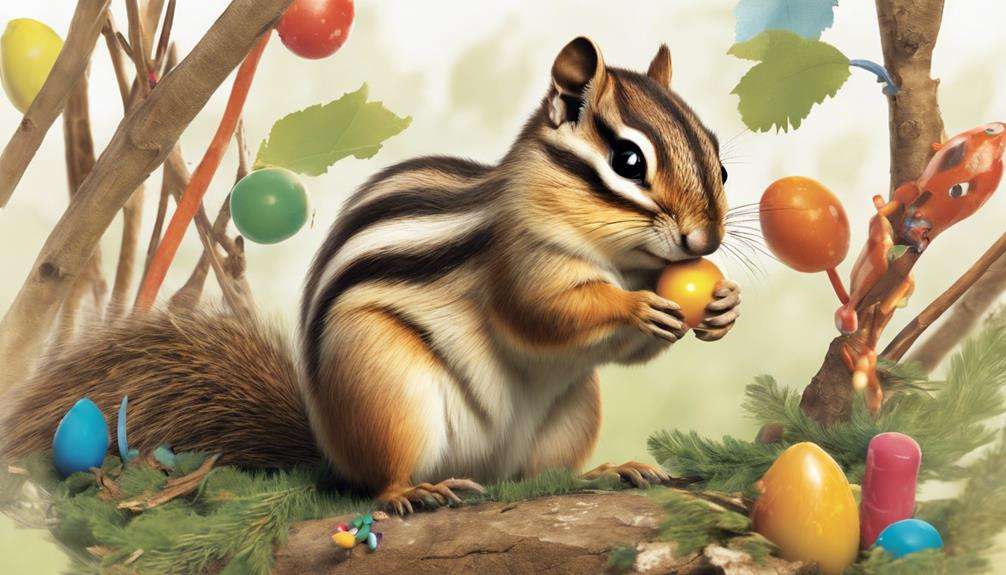
Chipmunks, small and active rodents with distinctive striped patterns and bushy tails, make charming additions to the world of small exotic pet animals. These small exotic mammals have an omnivorous diet, enjoying a mix of seeds, nuts, fruits, and insects. Chipmunks prefer habitats with access to wooded areas or shrubs where they can burrow and create intricate underground tunnels for shelter and storage. One fascinating feature of chipmunks is their cheek pouches, which they use to gather and transport food efficiently.
When considering a chipmunk as a pet, it's important to understand that they can be quite challenging to handle. Chipmunks are known for their skittish nature and are generally not fond of being held or touched by humans. However, with proper care and patience, these small creatures can provide endless entertainment with their lively antics and unique behaviors. Before deciding to bring a chipmunk into your home, make sure you're prepared to meet their specific care requirements and provide them with a suitable environment to thrive.
Degu
Degus, small rodents native to Chile, are known for their social nature and ability to form strong bonds with their owners. These social animals thrive on interaction and companionship, making them ideal for individuals looking for a pet that enjoys human contact. To guarantee the health and well-being of your Degu, it's important to provide a balanced diet that's high in fiber. Their unique dental structure requires this specific dietary need to maintain good dental health.
Being diurnal creatures, Degus are most active during the day and require mental stimulation and enrichment to prevent boredom. Due to their tendency to become obese, it's essential to offer them plenty of opportunities for exercise. Observing Degus in their group dynamic can be fascinating, as they've a complex social hierarchy. By understanding and meeting their social and dietary needs, you can enjoy a fulfilling and enriching relationship with these charming small mammals.
Spiny Mice
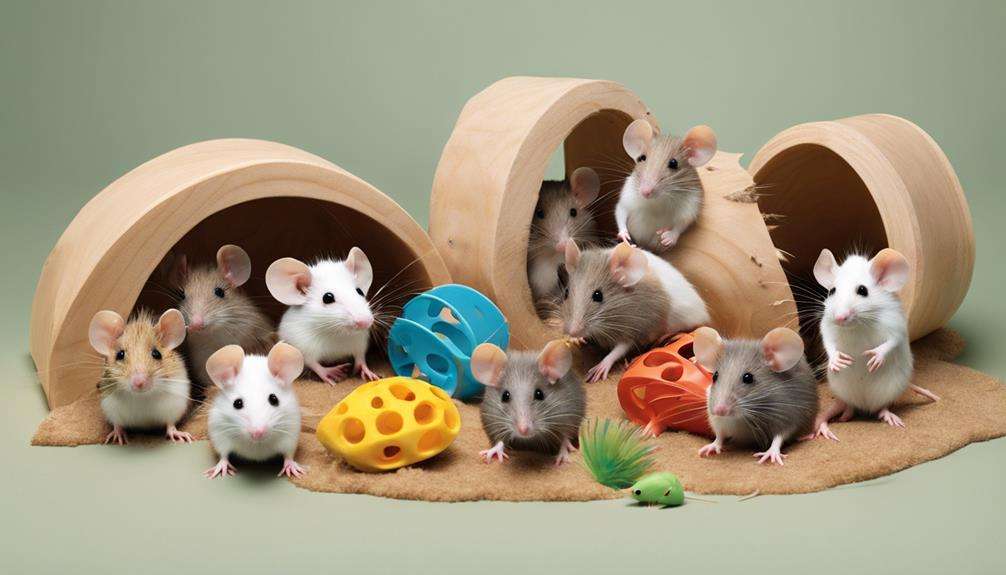
Spiny mice, known for their unique appearance and behavior, require specific dietary and housing conditions to thrive in captivity. As domesticated small mammals, they've specific dietary requirements that include a balanced mix of plant-based and protein-rich foods. Providing them with a varied diet is essential for their overall health and well-being. It's important to offer fresh fruits and vegetables alongside sources of protein like insects or high-quality commercial diets.
When it comes to housing, spiny mice prefer warmer environments and need bedding materials that allow for burrowing. Ensuring they've enough space to explore and exercise is vital for their mental and physical stimulation. Additionally, these small mammals are social creatures that benefit from interaction and companionship. Consider housing them in pairs or small groups to prevent loneliness and promote their natural behaviors.
Meeting the specific dietary and housing requirements of spiny mice is key to ensuring they lead happy and healthy lives in captivity.
Prairie Dogs
Prairie dogs, as small mammals, require specialized care due to their social nature and territorial behaviors. Understanding their complex communication patterns and dietary needs is important for their well-being in captivity.
Providing a spacious enclosure, mental stimulation, and a diet rich in grasses, seeds, fruits, and vegetables are key aspects of caring for prairie dogs.
Prairie Dog Care
With their affectionate nature and unique behaviors, caring for prairie dogs involves meeting specific dietary needs, providing ample mental stimulation, regular veterinary care, and prioritizing training and socialization for a well-adjusted companion.
Prairie dogs, as small animals, require a diet consisting of grasses, hay, vegetables, and occasional fruits to maintain best health. Ensuring they have access to a large enclosure with tunnels, hiding spots, and platforms is critical for their mental well-being.
Regular veterinary care is essential to monitor their health, especially to prevent common issues such as dental problems and obesity. Additionally, investing time in training and socializing your prairie dog will contribute to a happy and well-adjusted pet.
Prioritizing these aspects of care will help you build a strong bond with your prairie dog companion.
Behavior and Socialization
To understand prairie dogs' behavior and socialization, it's essential to recognize their highly intricate communication patterns and playful interactions within their underground colonies. These herbivores are highly social creatures, living in large colonies where they exhibit complex social behavior. Prairie dogs communicate through a variety of vocalizations and body language, allowing them to convey information about predators, food sources, and social interactions.
Their playful nature is evident in activities such as grooming, wrestling, and playing with objects, which helps strengthen social bonds within the colony. Prairie dogs form strong family units, with clear social structures and roles for different members, showing a remarkable level of social organization among these intelligent mammals.
Diet and Nutrition
Ensuring excellent health and well-being for your prairie dog involves providing a balanced diet rich in high-quality grass hay, fresh vegetables, fruits, and a small amount of commercial pellets. Similar to guinea pigs, pet care for prairie dogs includes offering a diverse range of foods to prevent dietary deficiencies.
Prairie dogs have specific calcium and vitamin D requirements important for maintaining strong bones and preventing metabolic bone disease. Providing fresh water daily to keep your prairie dog hydrated and healthy is vital.
Short-Tailed Opossum
Short-Tailed Opossums possess unique physical characteristics such as prehensile tails that aid in climbing and grasping objects.
Their omnivorous diet includes insects, fruits, vegetables, and occasional small mammals.
Due to their relatively docile nature, Short-Tailed Opossums are well-suited for experienced exotic pet owners.
Unique Physical Characteristics
Possessing a unique dental formula and a distinctive pouch for carrying their young, short-tailed opossums showcase fascinating physical characteristics that set them apart from other small mammals.
Unlike sugar gliders or pet hamsters, short-tailed opossums have prehensile tails that aid them in climbing and balancing. Their dental formula of 5/1/3/4, with five upper and one lower incisors, is distinct among small mammals.
Short-tailed opossums, both male and female, possess a pouch used for carrying offspring, although it isn't a true pouch like in other marsupials but rather skin folds. These unique creatures also exhibit self-anointing behavior, spreading saliva on their bodies, possibly for defense or communication purposes.
Dietary Needs and Habits
What dietary needs and habits should you consider when caring for a short-tailed opossum?
Short-Tailed Opossums are insectivores with high protein requirements, so include insects, mealworms, crickets, and small rodents in their diet. Due to their fast metabolism, provide frequent small meals throughout the day to sustain their energy levels. To guarantee balanced nutrition, supplement their diet with fruits, vegetables, and commercial insectivore diets. Be cautious of high-fat or sugary foods as they can lead to obesity.
Keep these small mammals mentally stimulated by offering a variety of food options, which also encourages their foraging instincts. Maintaining a diverse and balanced diet is essential for the overall health and well-being of Short-Tailed Opossums.
Behavioral Traits and Care
Considering the unique behavioral traits and care requirements of the opossum, understanding their solitary nature and need for privacy in spacious enclosures is essential. Short-Tailed Opossums, as exotic animals, thrive when given ample space to explore but also require hiding spots to retreat to when feeling overwhelmed.
Taking care of these pets involves providing a balanced diet that includes insects, fruits, and vegetables to meet their omnivorous needs. Additionally, engaging in regular grooming rituals and scent-marking behaviors is vital for their well-being.
As a responsible owner, it's important to schedule routine veterinary check-ups to monitor their health and address any potential issues promptly. By creating a suitable environment and attending to their specific care requirements, you can ensure a fulfilling companionship with your Short-Tailed Opossum.
Frequently Asked Questions
What Small Mammals Can You Keep as Pets?
You can keep a variety of exotic rodent breeds as unique small mammal pets. These creatures offer diverse personalities and traits, making them fascinating companions. Discover the joy of caring for lesser-known species that bring excitement to your home.
What Is the Best Small Animal to Have as a Pet?
When choosing a small animal pet, consider the exotic rodent breeds for their unique charm. The benefits of owning a chinchilla lie in their soft fur and gentle nature. Remember, the best pet is one that brings you joy.
What Is the Easiest Small Mammal to Take Care Of?
When caring for a small mammal, the easiest one to look after is the gerbil. They are curious, social, clean, and odorless pets. Providing them with enrichment activities and a balanced diet will keep them happy and healthy.
What Is the Most Low Maintenance Small Pet?
When looking for the most low-maintenance small pet, pocket-sized companions like gerbils or hamsters are excellent choices. They require minimal upkeep, making them ideal for busy individuals seeking a hassle-free pet ownership experience.
Conclusion
As you consider adding a small mammal to your family, the possibilities are endless. From the playful Chinchilla to the mysterious Short-Tailed Opossum, each breed offers a unique and rewarding pet ownership experience.
So, start on this journey with an open mind and a sense of wonder, as you never know what surprises and joy these lesser-known small mammals may bring into your life.
Let the adventure begin.
